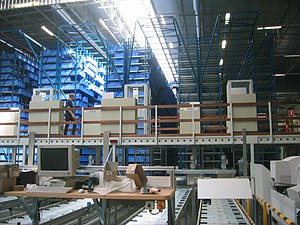
Image via Wikipedia
Securing sufficient warehouse space for your growing business is more complicated than finding a building large enough to hold all your product inventory. It’s also a question of anticipating how much warehouse space you’ll need in the months and years to come. Striking the right balance in your warehousing fulfillment seems, unfortunately, more or less impossible without the benefit of a crystal ball.
But by outsourcing your order fulfillment obligations, including you inventory warehousing, to a fulfillment house you gain the advantage of virtually unlimited storage space. Because your service provider manages your inventory in their warehouse the amount of storage space available is flexible.
The fulfillment service provider accepts deliveries from your manufacturer or supplier directly into their own storage facilities. That means that you no longer have to figure out where to store products, be there to accept deliveries, or work out the logistics of order storage and delivery. Instead, the service provider receives the inventory into its secure, climate controlled storage and processing center. By combining the two aspects of the fulfillment process into a single building the service company streamlines the packaging and shipping process and improves cost effectiveness for the client as well as its own profitability.
One a product is needed from inventory, the service provider’s trained and expert staff makes sure the product is securely and safely wrapped and bundled in preparation for its transit using a pre-designated, value-evaluated delivery service. Following the packaging, a tracking number is assigned and a label is applied to the package. This label can include not the service provider’s address but instead that of the client business, as well as its company logo. This helps insure that the customer not only understands the package’s relative source but also helps to foster the client business’ public image of order fulfillment accuracy and reliability.
Service provider companies typically extract a percentage of the profits from each unit warehoused and processed on behalf of their client business. They service several clients at once, helping to keep their own operating costs at a minimum and keeping their service options flexible. As their client businesses grow, their percentage allows them to grow as well, adding more services to reciprocally benefit their clients.

